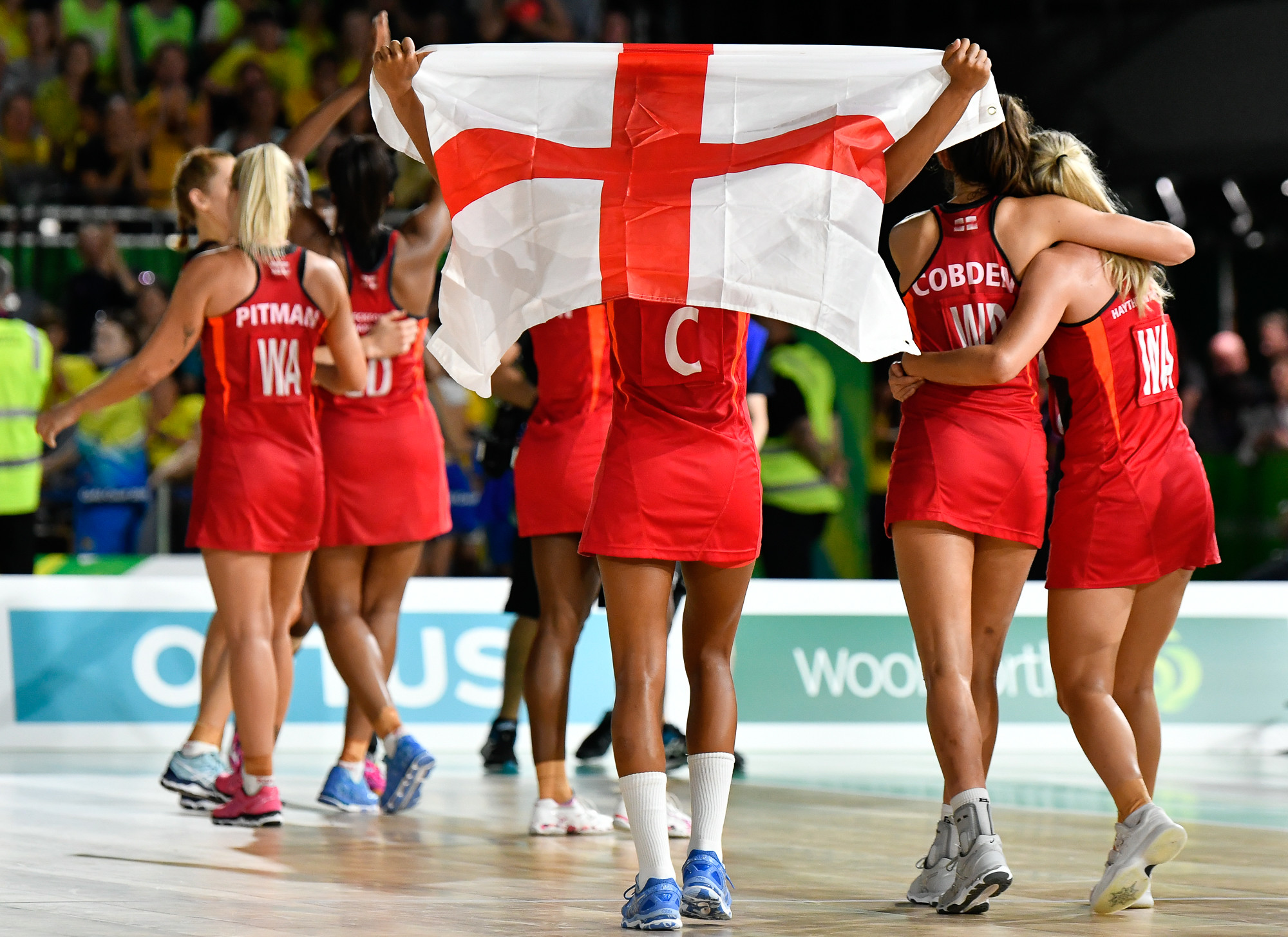
By Ian Harkin
As has so often been the case, the netball tournament, and in particular the gold medal game, was one of the biggest highlights of the entire 2018 Commonwealth Games held on the Gold Coast. Twelve teams battled it out over 11 days, producing many memorable moments, culminating in an action-packed final with a shock result.
Sunday, April 15, 2018 is a day that will live long in the memory of England netball fans, indeed netball fans everywhere. That was the day that England caused one of the biggest boilovers in netball history when they stunned the heavily favoured Australian team to win gold. It was a huge moment for English netball; one that saw the popularity of the sport rise overnight in that country. The team stood up when it counted on the biggest stage, fulfilling the promise they had displayed on several previous occasions, and righting the wrongs from the heart-breaking 2014 Games in Glasgow.
The result of the gold medal game seemingly came out of nowhere, with many people expecting an easy win for the home team, based on the form they had shown in their previous matches. In fact, it’s doubtful that any netball team has ever played any better than Australia did in its six games leading up to the gold medal game. In their pool games, they defeated South Africa by 22 goals and Jamaica by 21, before inflicting New Zealand’s biggest ever defeat at a major tournament when they beat them, also by 21 goals, in the semi-final. Every player in the squad contributed as the Australians despatched all of their opponents with such ease, it made them the overwhelming favourites for gold.
Madi Robinson, one of the stars of the Australian side that beat New Zealand by 21 goals in the semi-final. Image Marcela Massey
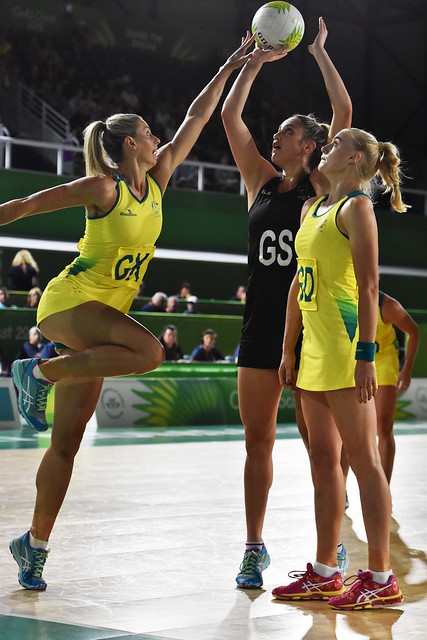
Laura Geitz kept the pressure on the kiwis. Image Marcela Massey
But if Australia was supposed to be near certainties, somebody clearly forgot to tell the English team that. They had gone through to the final undefeated as well, albeit less convincingly. But perhaps more importantly for them, they had played tougher, more competitive matches in the lead-up. That included wins in their pool over Uganda by six goals and New Zealand by nine, before a thrilling come from behind one-goal victory against Jamaica in the semi-final on the day before the final.
The semi-final was highlighted by the crucial battle between Geva Mentor and Jhaniele Fowler-Reid. For three and a half quarters, Jamaica’s giant shooter and captain, Fowler-Reid, was on top in that match-up. And so was her team. They were playing controlled netball in attack and appeared to have the answers, especially with goal keeper Shamera Sterling excelling at the back.

The semi-final battle between Jhaniele Fowler-Reid and Geva Mentor. Image Simon Leonard
Typifying the champion that she is, Mentor, simply refused to give up and she kept pressuring Fowler-Reid time and time again, even when it looked like a lost cause. Slowly but surely, the work of Mentor along with her defensive partner Eboni Beckford-Chambers, bore fruit, and they induced some errors from Jamaica in the last term.
Having been in control, the Sunshine Girls were now flustered. They scored just eight goals in a tense last quarter. In a dramatic finish, Jo Harten nailed the winning goal for England with just one second left on the clock, prompting huge celebrations from the players and coaching staff. England was through to the final of a major tournament for the first time.

England players and support staff celebrate their one goal semi-final win over Jamaica. Image Marcela Massey

English players console Jhaniele Fowler-Reid. Image Simon Leonard
And so, to the final. With Australia having dominated all of its opponents to such a degree, the proud boast was that they didn’t know what their strongest seven was. Sadly, for them, those words would prove prophetic in the battle for the gold. In a match that was close throughout, for the first time in the entire tournament, the Australians were suddenly under pressure. The Roses were anything but overawed by the occasion of a Commonwealth Games final. They were up for the challenge. Composed, and motivated, they were unlike any of the Diamonds’ earlier opponents, and wouldn’t go away.
Australia led by one at quarter time, and with the score deadlocked at 25 all at halftime, coach Lisa Alexander went to her bench. Only two Diamonds players remained in their first half position for the start of the third quarter. Former captain Laura Geitz had five gains in the first half, but was replaced by Courtney Bruce and spent what would be the last two quarters of her stellar international career on the bench. This was just one of the numerous positional changes made by Alexander during the game as she tried to find the winning formula. Wing defence Gabi Simpson was the only Australian player who remained on court for the full sixty minutes.

Chelsea Pitman was an integral part of the win against her former side. Image Simon Leonard.
Meanwhile, England coach Tracey Neville stuck solid with her chosen starting seven for the majority of the game. Mentor had an enormous match once again. She had the better of Australian captain Caitlin Bassett in the first two quarters, then dominated Caitlin Thwaites in the third, before Bassett returned for the final quarter. Mentor had an incredible 12 possession gains for the match and along with Eboni Beckford-Chambers, she was a constant menace whenever Australia had the ball in their attacking third.
Serena Guthrie also starred in the pivotal role of centre, and received great support from her fellow midcourters. Beth Cobden in particular, was on fire at wing defence, shutting down numerous Australian attacking opportunities. Wing attack Chelsea Pitman who had a staggering 31 goal assists in the semi-final, had another 18 in the final against the country she previously represented. Then there was the shooting end. Harten and Housby proved just how valuable they were to the England team in this tournament.
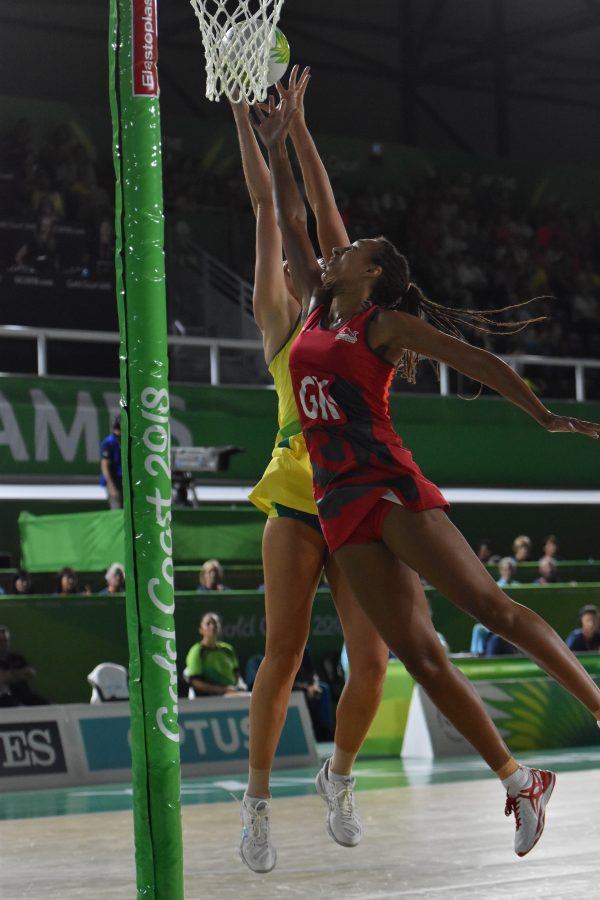
Geva Mentor starred in the final with 12 possession gains. Image Marcela Massey

Mentor and Beckford-Chambers kept constant pressure on Australia’s shooters. Image Simon Leonard
The Diamonds worked hard to establish a 38-36 lead at three-quarter time. They restricted England to just 11 goals in the quarter, and looked to be getting on top. It appeared they had finally weathered the English storm when they extended their lead to four goals in the final period. It was then that Australian centre Kim Ravaillion, unfortunately, made two crucial errors, both of which the England team gleefully pounced on. In fact, Australia committed five turnovers in all in the last quarter, while England made none. During the whole match, Australia had seven more turnovers than the Roses, exemplifying the pressure that England was putting on them.
Another telling statistic was the penalty count. While there was only two the difference overall, Australia was very heavily penalised in the crucial final quarter, to the tune of 25-10. The most important of those 25 penalties occurred at the very end of the match. With scores level at 51-51 and only 14 seconds left on the clock, England had the last possession of the game. In a frantic ending, Harten threw up an air-ball which somehow fell fortuitously into the hands of Housby. She also missed with her rushed shot, but Bruce was deemed by the umpire to have infringed. Given another chance, Housby didn’t miss this time.
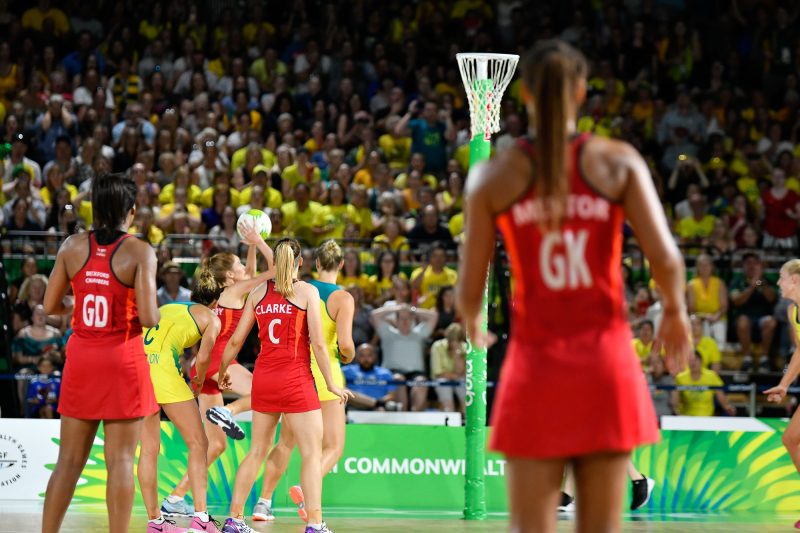
Players and fans look on anxiously as Housby makes her first rushed attempt at the winning goal. Image Simon Leonard

Given a second chance, Housby didn’t miss this time. Image Marcela Massey
The Roses had done it. Neville and her team had achieved something that for many years had looked impossible. Cue scenes of absolute delirium as the England team celebrated wildly, culminating with a mad pile-on of joyous players. Seemingly, even they couldn’t believe what they had just accomplished. It’s fair to say that everyone in the arena was stunned by what they’d witnessed, and probably everyone watching at home was too. It was an amazing result for international netball; the first time in history that a country other than Australia or New Zealand had finished as outright winners of one of netball’s two major tournaments.

Helen Housby’s reaction after she shoots the winning goal for England. Image Marcela Massey

The England team celebrates wildly after winning gold. Image Simon Leonard
The Australian players couldn’t believe what had happened either. They were dazed, shell-shocked, totally numb. The Diamonds had played well below their best in the final but that was largely down to the relentless pressure the England team had placed on them, creating doubts and confusion in their minds. It appeared that the lack of tough, competitive netball in their previous six matches had come back to bite them.
For Australia, a country so used to winning big events, this result was a bitter pill to swallow. But for the sport of netball, this was a huge event, and signalled a real turning point. Where once the sport was seen as a battle between just two nations, England had shown that the trans-Tasman dominance could be broken. It was not only a huge boost to them, but also to countries like Jamaica, South Africa, and indeed anyone else who may have previously thought they had little chance of ever claiming the top prize.

Australian Coach Lisa Alexander and her distraught players after the match. Image Simon Leonard
While England’s final win was no doubt the biggest story of the 2018 Commonwealth Games netball tournament, the second-biggest was the performance of New Zealand. For a country with such a proud history on the international stage, the Silver Ferns were at this stage, something like a train wreck. The team, led by Katrina Rore, had shown poor form in the months leading up to the Games, losing matches to Australia, England, and Jamaica twice.
It certainly didn’t help that champion midcourter, Laura Langman was missing from the team, having been deemed ineligible by Netball New Zealand because she was playing in Australia’s Super Netball competition instead of the ANZ Premiership. There were reports of infighting and low morale, and it was obvious that coach Janine Southby was struggling to find answers, or to gain the support of the players. The problems surrounding the team were obvious on Sunday, April 8, when the Ferns suffered the shock of losing to Malawi for the first time.

Malawi’s Jane Chimilaro reacts after her country defeated New Zealand. Image Marcela Massey

The Malawi team dances on court after defeating New Zealand for the first time. Image Marcela Massey
New Zealand was fortunate to even make the semi-finals, finishing equal on points with Uganda and Malawi, and qualifying purely on goal difference. Once there, they were beaten comprehensively by Australia, and then went on to lose the third-place playoff to Sasha-Gaye Henry’s Jamaican side by five goals. Goal keeper Shamera Sterling was the star of the show, picking up 10 possession gains (to go with the 10 she got in the semi-final) and showing to everyone what a star she was going to be for years to come in international netball.
Having lost four of their last five matches in the tournament, the Silver Ferns finished without a medal for the first time ever in international netball. That was to be Southby’s last game in charge. For whatever reason, she had been unable to get her team to gel and there was just something missing there. Noeline Taurua took over not long after and began the unbelievable turnaround that would result in a World Cup win just the following year.

Romelda Aiken and Shanice Beckford celebrate winning the bronze medal game against New Zealand. Image Marcela Massey
There were many highlights away from the top four countries. South Africa didn’t feature in the medal games, but when they came up against Jamaica in their decisive Pool A clash, they challenged strongly. In fact, they led by one goal at three-quarter time before the Sunshine Girls pulled away in the final term. The Proteas went on to reverse that result the following year in Liverpool.
Meanwhile, despite their history-making win over New Zealand, Malawi was actually overtaken by an ever-improving Uganda at these Games by virtue of a 54-52 result when the two African countries met in Pool B. Malawi also had a tough battle with Scotland before eventually winning a nail-biter by just one goal.
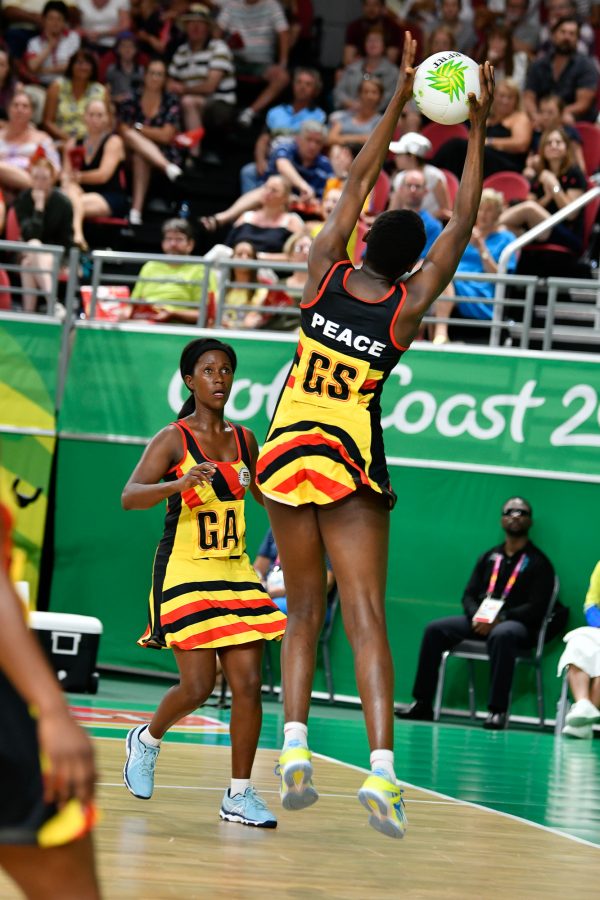
Uganda’s Proscovia Peace and Rachael Nanyonga starred against Malawi. Image Simon Leonard
In 2018, as with any major tournament, several players announced themselves to the netball world, while others had their reputations enhanced. We can expect exactly the same this year in Birmingham in 100 days from now. The 2022 Commonwealth Games netball tournament is set to begin on Friday, July 29. The groups are in fact quite similar to four years ago. Group A is made up of Australia, Jamaica, South Africa, Scotland, Wales and Barbados, while Group B features New Zealand, England, Malawi, Uganda, Trinidad & Tobago and Northern Ireland.
Here is a schedule. The gold medal final is set down for Sunday, August 7 at 8:30pm UK time. That translates to the following times:
Jamaica: Sunday 2:30pm
Southern Africa: Sunday 9:30pm
Western Australia: Mon 3:30am
Central Australia: Mon 5:00am
Eastern Australia: Mon 5:30am
New Zealand: Mon 7:30am
Make sure to tune in. International netball has never been more open, and as 2018 proved, you just never know what might happen.
IN SUMMARY: 2018 COMMONWEALTH GAMES, GOLD COAST

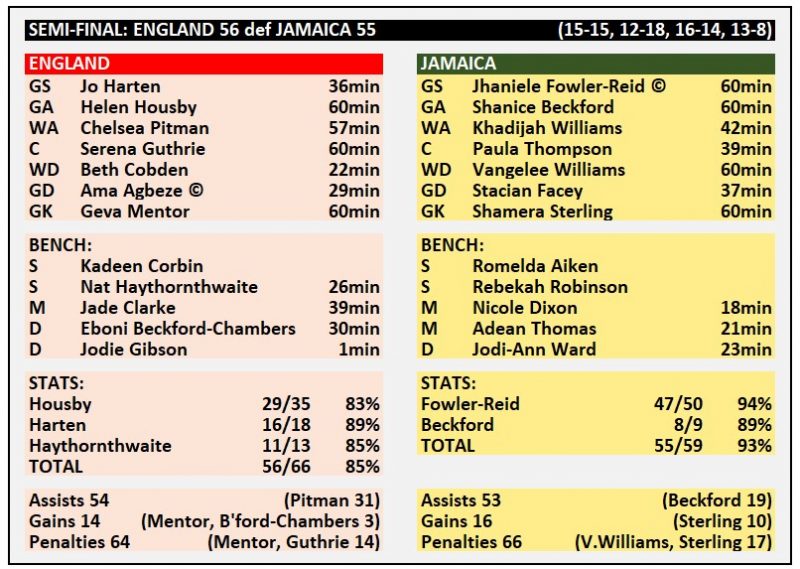



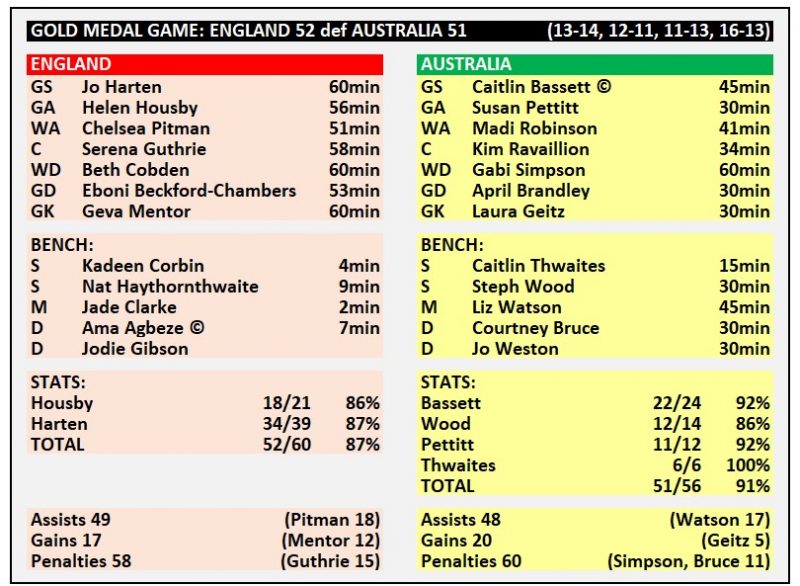


The England players watching their flag being raised at the medal ceremony. Image Marcela Massey
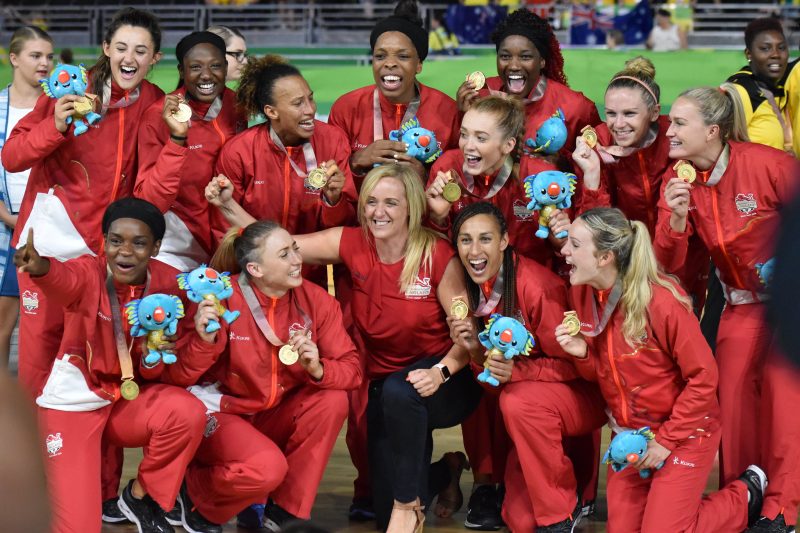
Tracey Neville with her gold medal winning English side. Image: Marcela Massey
